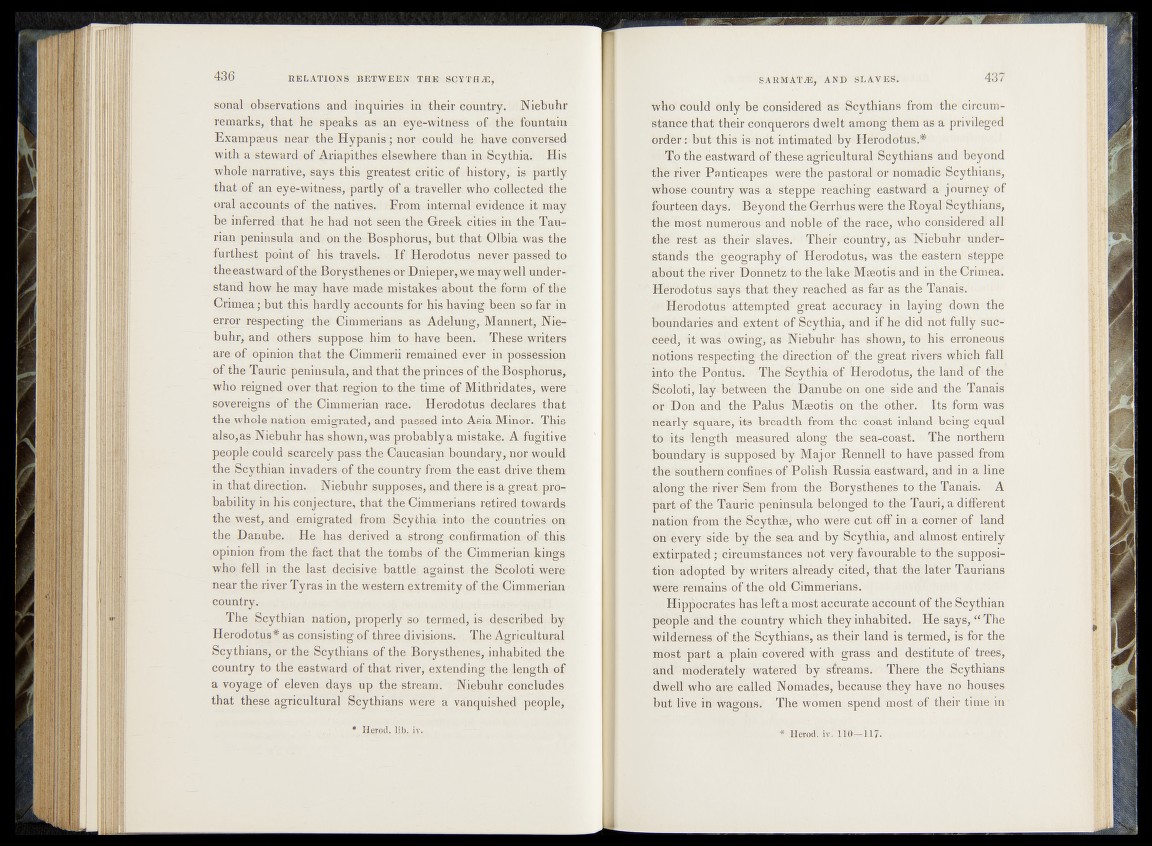
sonalobservations and inquiries:-in their cóuntry. bNwfeuhr
remarks, that kM*;speaks as an eye-witness of thóbftauntain
Examparus near the Hypanis'; nor?could he have conversed
with a-steward of MMhpitbèè eftSewhere than in-Scythia, flip
wh<>I#lpaTrativ% says« this greatest critic: of -historyis» partly
that of an eye-witness, partly of a trayeller who collected thé
oral accóWrits^oJl the nativesid tEroin -internahevidence' it may
he-jnferred that h e had not seen the Greék cities; in the Tau-
rian peninsula and on the Bosphorus, but that Olbia was the
furthest point of his travels«- If Herodotus never passed to
theeastward of the Borysthenesor Dnieper, we may well under-)
stand howt he may have made, mistakes* about the form of the
Crimea; but this hardly accounts for his having. beeh;;s.otfar in
error respecting :th ^ Cimmerians?ns Adelungp Manner,tp^ji^
buhr, and others; suppose him to have. been.w These writers
are of | opinion that-the .Cimmerii remained ever in possession
of the Tauric peninsula, and that the princes of-tke-Bcsphorus,
who reigned ©yer.that, region, töutliêrtimè of M ith rid a ^ i^ e jre '
sovereigns of theCimmerian race. Herod0tue?d^c]|£resCih at
the whole nation emigrated, and passed into Asija,Minor. This
alsojas ^iéhtthrhas shown, was probably a mistake. A fugitixe
people could scarcely pass the Caucasian'jbQundary^q^wQnld’
the Scythian invaders of the country from-the .east driver them
that direction. Niebuhr supp^ès, and th e re js a .g # ^ p rè r5
bability in his conjecture, that the.Cimmerians retlijed ld ^rd s
the west, and -emigrated .-from Scythia into -the^c^n tries. ,on
the Danube. He has derived a strong confirmation.- of, this
ppiniuu from the factThat the .tómbs ó f the CimHiefia%.Mógs
who fell in the last decisive little ] against? the Scplqt^iwere
near the river Tyras in the western extremity of fhe,|Qijpmerian
country.
The Scythian nation; properly so termed, is - described: by
Herodotus* as consisting of three divisions. -, TheAgrioultural
Scythians,,pr the Scythians of the Borysthenes, .inhabited the
country to the eastward of that river, extending the length of
a voyage of eleven, days up the stream- Niebuhr concludes
that thpse agricultural Scythians were a vanquished people,
• H.eïod.,
who‘ eohld only be considered as Scythians from the circumstance
th a t their conquerors dwelt among them as a privileged
brdervaiwit' this isiiiot intimated by Hefodotus.*
--1 ^To the 'eastward of these agricultural Scythians and beyond
the river Pantióapes? wère-the pastoral or nomadic Scythians,
whtosC^'coArtry was* d- StêppM^êaóhirig eastward a journey of
fourteen days.’«'"Beyond the GeVrhus were the Royhl Scythians,
the móst.numerous! and ’noble of the racd, who considered all
thn rest as their slaves;- Their'-dountry; Use Niebuhr understands
fche^gèögraphy ©T HbVodótusjlwas the eastern steppe
abdut'the river Donnetste'the 1’ake Mseotis and in the Crimea.
HdrodotU^sSys that theyretched as far as -the Tanais.
W-HeVodotus attempted great-'accuracy in laying down the
boundaries* arid eXtêri-t of Scythia, «arid if hfel’did not fully succeed,
'it wasfow-fcg'tias Niebuhr: has shown, to -his erroneous
notiorifeire&póctmg-the-direction ofy thbigfeat -fivers which fall
into the Pbrithst ■ -The Scythia^if Herd&tuk, thedand? of the
•jföblbti, layöbfcfobeeh’ the' Danube on one1 sideband the Tanais
©f D è i^1 arid* the Palus^Maeötis on thei oth er.! Its form was
flkafly s^ :uhre;< ifS^breadth from the »-coast-inland -being equal
tö tits^feh-gth* measured along the. sea-coast'. 1 The northern
boundary is supposed by- Major Rennell to have passed from
iHaidsbrithern cönöfrës of Polish Russia eastward, andife| a line
along the river Serri from ■ thej Borysthilpl to -the Tariais>" A
part of the Tauric peninsula belonged fco óhe Tauri, a different
É*atión-from:the Sóythee; who were cub off in a coriier of land
Onievbry: side *"by the sea« arid-by Scythia, and; almost entirely
extirpated ;f dircumstafiOes ’not very favourable to the supposition
adopted | p writers already5 cited, that t i e later Tauriahs
Were remains of the" old Cimmerians.
Hippocrates has felt a most accurate account of the Scythian
people and the country whickdhëy inhabited. He saysy“ The
WildeWiessi&f the Scythians, as their land is ierriied; isfbr the
mëfef part- a plain covered with *-grds|f; and destitute of trees,
and toóderately watered -by sfrearns.- There the Scythians
dwhll who aite called Nomades, because they have no houses
briff liy! in Wagons. The womenj épend moét of their time in
* Hèrod.'iv. 110—117.